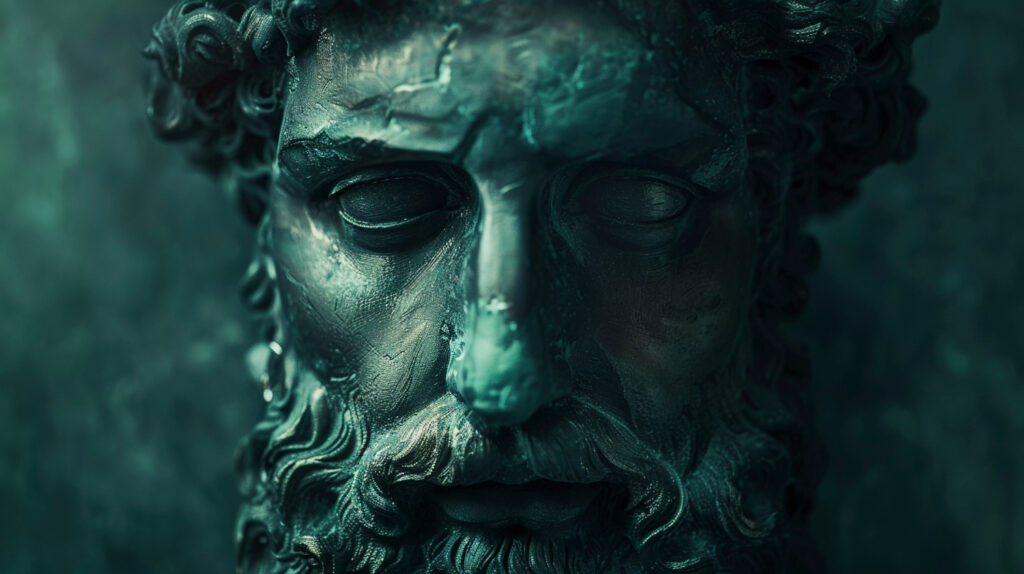Consider being the ruler of one of the largest empires in history, pondering on life, death, and duty. This was the life of Marcus Aurelius, the Roman Emperor, who balanced his intellectual pursuits with the duties of leadership. Often acclaimed as the “philosopher king,” Marcus Aurelius’ leadership and writings have left a lasting effect. His reflections, collected in Meditations, are a source of wisdom and direction for anyone pursuing morality and wisdom in a confusing world. Let’s explore the lives and times of this remarkable king and discover how his moral code shaped his rule.
Nascent Years and Instruction
On April 26, 121 AD, Marcus Aurelius was born into a distinguished Roman family that was entwined with the governing class. He was designated for greatness from an early age and was educated with a focus on rhetoric, philosophy, and jurisprudence. Marcus had a genuine admiration for Stoicism, a philosophical tradition that would profoundly influence his worldview, under the guidance of esteemed tutors.
Rise to Domination
Marcus’s trajectory to sovereignty was set when Emperor Hadrian adopted him posthumously through his successor, Antoninus Pius. This adoption, which included Marcus’s engagement to Pius’s daughter Faustina, positioned him as a prospective leader. The first instance of co-emperors in Rome occurred when Marcus Aurelius and his adopted brother, Lucius Verus, took the throne in 161 AD.
The Meditations
The Meditations is an anthology of personal introspections penned by Marcus Aurelius during his martial campaigns. Initially intended as private annotations, these writings furnish profound insights into his thoughts and adversities. Themes such as life’s impermanence, the importance of upholding integrity, and the worth of inner tranquility permeate the text, offering timeless sagacity to readers.
Personal Life and Kin
Marcus Aurelius wed Faustina the Younger, and together they had numerous offspring, though many did not survive into adulthood. His relationship with Faustina was a wellspring of personal fortitude, and her demise in 175 AD profoundly affected him. Marcus’s decision to appoint his son Commodus as his successor was driven by the quest for stability, though it eventually ushered in a tumultuous period for the empire.
Marcus Aurelius as a Martial Leader
A realistic and brilliant tactician, Marcus Aurelius was revered as a martial leader. His numerous instances of leading his armies into battle demonstrated his commitment to the empire’s defense.
Death and Succession
Marcus Aurelius died at Vindobona, on March 17, 180 AD. This was Vienna at the time. The Roman Empire had relative peace and stability during the Pax Romana, which ended with his death. Under his father’s systematic and erudite reign, Marcus’s plan for his son Commodus’s succession was markedly different.
Misunderstandings and Legends
Notwithstanding Marcus Aurelius’s enduring impact, many myths and misunderstandings exist about his life and reign. A few of these myths include idealized portrayals of him and inflated tales about his combat prowess. We may gain a deeper understanding of the actual significance of his leadership and ideas by clearing up these errors.
In conclusion
A unique view into the intricacies of office and the enduring power of thought was given by the life and reign of Marcus Aurelius. He left behind an eternal legacy that remains useful as a source of inspiration and guidance for people today because of his fidelity to the Stoic ideals and his ability to overcome the challenges of his day. We are reminded of the enduring value of tenacity, skills, and integrity when we contemplate his achievements.
FAQs
What makes Marcus Aurelius more renowned?
The literary works by Marcus Aurelius, mainly his Meditations, are what make him popular. It reflect his ideas on duty, ethics, and the meaning of life, and they additionally reflect his Stoic beliefs.
What role did Marcus Aurelius’s make to stoicism?
Marcus Aurelius made an important contribution to stoicism through integrating stoic ideals into his style of leadership and by thinking on himself. His works place a heavy focus on the value of reasoning, self-control, and having faith in one’s fate.
During the time he ruled, which challenges did Marcus Aurelius face?
During his reign, Marcus Aurelius faced multiple challenges, including warfare wars like the Parthian and Marcomannic Wars as well as the horrible Antonine Plague.
What were the effect of Marcus Aurelius’s reign on the Roman Empire?
During difficult times, Marcus Aurelius’s rule kept security and stability, which had an impact on the Roman Empire. His point of view has made a significant impact on future generations of leaders and intellectuals.
